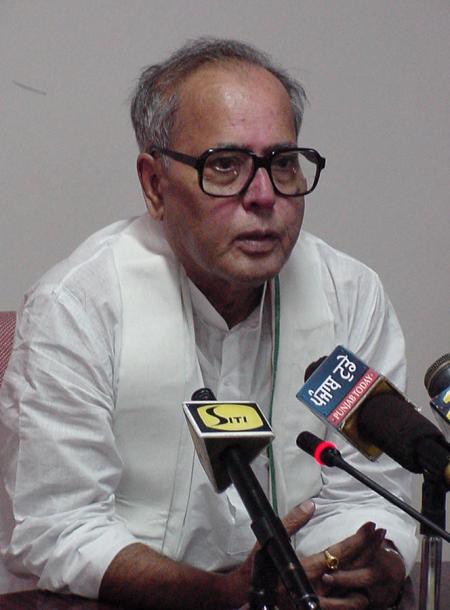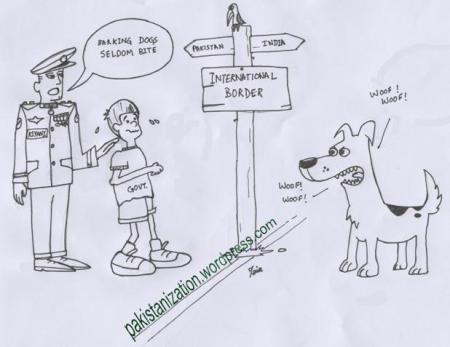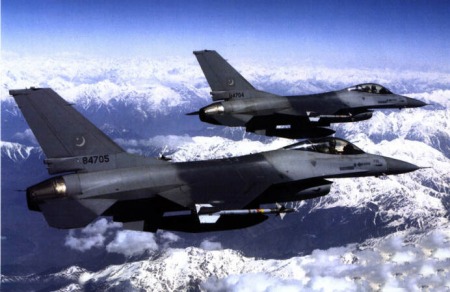With Mullen asking for a guarantee that PAF will not respond to Indian surgical strikes.
General Kiyani is said to have responded with showing Mullen a photograph of an IAF Mirage-2000 locked by Pakistan Air Forces’ F-16 taken on December 13th. ‘Next time, we’ll bring it down’, Mullen was told.
To make sure the message was loud and clear, Pakistan Air Force jets started patrolling the skies in hot mode and a red-alert was issued througout the country.

- Picture: The defeated Mukherjee.
With India and Pakistan standing eyeball to eyeball, it was India who blinked first, with its media and officials admitting defeat on the diplomatic front.
Times of India writes:
While the de-escalation should soothe the tense nerves of the international community, it was being feared that Islamabad, by raising the bogey of war, may have edged out India’s concerns. By feeding fears of an imminent conflict between two nuclear-armed rivals, it had ensured that the focus would shift towards conflict prevention. Indian security experts noted that Gilani made it a point to mention that “our friends are persuading India against aggression”.
While the government persisted with reminders to Islamabad about unkept promises, independent security experts sid Pakistan may have got away with almost no cost at all. “As of now, Pakistan has managed to divert attention from the Mumbai attacks to an India-Pak conflict,” said K Subrahmanyam.
It was diplomacy by fear, and Pakistan played it effectively. As it allowed passions to run high and let known terrorists join in the show of national belligerence, it was also playing victim. As part of the script, its foreign secretary, it now turns out, even summoned the Indian high commissioner in Islamabad, Satyabrata Pal, on Friday to lecture him on the need for India to bring down tensions.
The US and China had on Friday asked India – in a clear sign of Pakistan’s success – to engage in a dialogue with Pakistan. It’s becoming increasingly evident that India has so far nothing to show for all its diplomatic offensive in the aftermath of the Mumbai attacks.
How could things have gone so wrong, wonders Vir Sanghvi of the Hindustan Times:
I am now coming round to the view that they’ve only gone wrong for us. They’ve gone very right for Pakistan. Islamabad has got exactly what it needs, and what it always wanted.
Consider what’s happening today. The operation in the tribal areas has stalled. The Taliban have sworn to back the Pakistan army against India. Troops have been moved to the Indian border. The incoming Obama administration is talking about appointing a special envoy for India and Pakistan.
And forget about acting against those who organised the Bombay attacks. Pakistan isn’t even willing to hand over Dawood Ibrahim or Masood Azhar. Moreover, Washington seems largely content with this state of affairs.
I don’t want to sound like a pessimist or a war-monger — especially since I have always applauded New Delhi’s moderation and restraint — but it is beginning to seem to me that Pakistan has out-manoeuvered both India and America.
M K Bhadrakumar writes at Asia Times Online:
By gently holding out the threat to the US that the Afghan operations would grievously suffer unless Washington restrained Delhi from precipitating any tensions on the India-Pakistan border, Islamabad seems to have neatly pole-vaulted over Rice to appeal straight to the Pentagon, where there is abiding camaraderie towards the Pakistani generals.
With Pakistan’s recalcitrance and Mullen’s veiled threat of reopening the Kashmir file, a sense of frustration is gripping Delhi. Pakistan has ignored India’s tough posturing. The faltering Indian security agencies, which have been in a state of appalling decline in recent years, seem to have failed to put together any hard evidence of a Pakistani involvement in the Mumbai attacks.
All indications are that Pakistan is not impressed by the Indian rhetoric. It seems to think Indian politicians are grandstanding in an election year. But, just in case Delhi may spring a surprise, Pakistani army chief General Ashfaq Kiani has warned that the armed forces would give an equal response “within few minutes” if India carried out any surgical military strikes. “The armed forces are fully prepared to meet any eventuality, and the men are ready to sacrifice for their country,” he reportedly said.
Just as we predicted, an all out war seems to have been averted and Indian media and officials are admitting defeat.
China, Saudi Arabia and Iran have come out strongly in the last couple of days which saw an intense diplomatic effort by all parties to make it clear to India that they not only remain unconvinced of Delhi’s allegations, but also that any attack could have serious consequences for India and the region as a whole.
Pranab Mukherjee was made to do an embarassing u-turn on India’s previous stance previously, admitting that terrorism – a global issue and not a bilateral one – should be fought jointly.
The Indian officials have also been made to back-track from their earlier claims of deploying troops along the border with Pakistan.
Times of India, December 22nd:
Even as India refused to take the military option off the table while asking Pakistan to rein in the terrorists, the Indian Army’s and IAF’s quick reaction teams (QRTs) were deployed along the borders in the Western Sector.
“Runways, hangars, main roads, ammunition stores and other sensitive places have been provided with additional cover. Sophisticated radars are installed at a few air bases and we are keeping watch on each and every cross-border activity,” said an IAF personnel.
Indian forces were on regular firing exercises at locations like Lathi Firing Range in Jaisalmer, Mahsan in Bikaner, Suratgarh and Ganganagar.
India Today, December 27th:
India has informed Pakistan that it has not engaged in any sort of troop build-up along the frontier
In response to the ‘deadline’ set by India and the threats from Sonia Gandhi and Pranab Mukherjee, Pakistan had gone on a diplomatic counter-offensive, briefing world powers and countries in the region on the deteriorating relations with India and the steps taken by it to address Indian concerns. Foreign Secretary Salman Bashir met ambassadors of the five permanent members of the UN Security Council — the US, Britain , China , France and Russia . He also met ambassadors of Italy , Japan , Germany , Saudi Arabia , Iran and Turkey soon after returning from France where he had gone for annual bilateral consultations. However, his most crucial meeting was with Indian High Commissioner Satyabrata Pal at the Foreign Office when he said that India should defuse tension.
Mr Pal was accompanied by his deputy Manpreet Vohra. The Indian side was categorically told that any ‘surgical strikes’ would be considered a declaration of war. India was urged to respond to Pakistan ’s proposal for joint investigation into the Mumbai attacks.
According to sources, the Indian diplomats looked sombre when they came out of the meeting.
As things stand, the possibility of war has been averted for now in which is being seen as a massive diplomatic victory for Pakistan.
This of course does not mean that we should let our guard down. In addition to the diplomatic counter-offensive, it was Pakistan Army’s seriousness that put India on the backfoot.
Once the realization set in that any further attempts to enter Pakistan Airspace will be punished severely by the PAF, the Indians had gone to plan B, with Mullen asking for a guarantee that PAF will not respond to Indian surgical strikes.
General Kiyani is said to have responded with showing Mullen a photograph of an IAF Mirage-2000 locked by Pakistan Air Forces’ F-16 taken on December 13th. ‘Next time, we’ll bring it down’, Mullen was told.
To make sure the message was loud and clear, Pakistan Air Force jets started patrolling the skies in hot mode and a red-alert was issued througout the country.
Failing to get that guarantee, the chance of an Indian strike was reduced significantly. For them it was never about a full war. A few surgical strikes on pre-agreed locations would have been enough to relieve some of the pressure the Indian Government faces domestically. Pakistan Army on the other hand made it clear that any action from India would be taken as a declaration of war, and the response would be swift and decisive.
India faces humiliation now on the diplomatic front having failed to achieve anything from this standoff.
In its attempts to isolate Pakistan by building what it saw as a definitive case, it is India that stands alone on the diplomatic front and is left with begging the Iranians and Chinese to put pressure on Pakistan.
We can now expect an intense and sustained terrorism campaign in Pakistani cities in an attempt to destabilize the country along ethnic / sectarian lines – New Delhi’s time-tested method.
On the diplomatic front India will be lobbying hard to have the ISI (and Pakistan Army) declared as terrorist organisations.
We can also not rule out another false flag attack in the next few weeks.
Pakistan needs to stay united.
Its not over yet.
Courtesy: PKKH.
Admin’s comment: India as usual under-estimated Pakistan, by threatening Pakistani Govt. of dire consequences soon after the Mumbai operation was carried out. Pakistan luckily had a rather castrated set of people running the state of affairs at the presidency. They bowed down to Indian pressure and began pursuing the path to destruction on Indian dictation. Pretty soon however, Indian Airforce made the mistake of provoking the Pakistan Army, that was simply observing the whole drama from the pavillion. When provoked, Pakistan Army came to the rescue and thrust behind these bloody politicians and locked horns with Indian forces, which after witnessing Pakistani muscle couldn’t do much except wet their pants. This led to the final results of this whole drama causing the barking from Indian side to be silenced as their Defence Minister made a conclusive statement that has been discussed in the article above.




